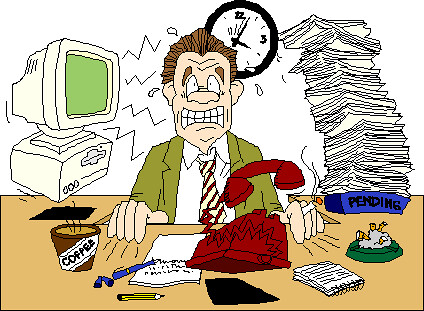Since 1977, Jon Michael Probstein has assisted people and businesses in all matters. In accordance with the Rules of Professional Conduct, this may be deemed "Attorney Advertising". Nothing contained herein should be construed as legal advice. Admitted in New York and Massachusetts. Always consult a lawyer regarding any matter. Call 888 795-4555 or 212 972-3250 or 516 690-9780. Fax 212 202-6495. Email jmp@jmpattorney.com
Wednesday, March 8, 2017
WORK RELATED STRESS AND WORKER'S COMPENSATION
MATTER OF CUVA v. State Ins. Fund, 2016 NY Slip Op 7734 - NY: Appellate Div., 3rd Dept. 2016:
"We affirm. It is well established that "mental injuries caused by work-related stress are compensable if the claimant can establish that the stress that caused the injury was greater than that which other similarly situated workers experienced in the normal work environment" (Matter of Lozowski v Wiz, 134 AD3d 1177, 1178 [2015] [internal quotation marks and citation omitted]; see Workers' Compensation Law § 2 [7]; Matter of Guillo v NYC Hous. Auth., 115 AD3d 1140, 1140 [2014]; Matter of Witkowitch v SUNY Alfred State Coll., 80 AD3d 1099, 1100 [2011]). In resolving that factual question, the Board's determination will not be disturbed provided that it is supported by substantial evidence (see Matter of Lozowski v Wiz, 134 AD3d at 1178).
While the medical evidence concluded, based upon claimant's self reporting, that the March 7, 2013 incident caused or exacerbated her mental health problems, substantial evidence supports the Board's factual determination that the incident was not compensable on the ground that the work-related stress suffered by claimant that led to her anxiety, PTSD and depression was not "greater than that which other similarly situated workers experienced in the normal work environment" (Matter of Lozowski v Wiz, 134 AD3d at 1178 [internal quotation marks and citation omitted]). Regarding the incident, claimant testified that she was standing outside the examiner's cubicle discussing a work issue when he became angry, grabbed the arms of his chair and began "shaking," gritting his teeth and "seething," making a hissing sound. However, he remained seated, facing his computer and did not make verbal or physical threats or raise his voice. While claimant testified that the examiner swore at her during the encounter, the WCLJ credited a coworker who testified that she had overheard "a work interaction" in which claimant and the examiner "disagreed" and that she had informed claimant, after the incident, that the examiner used profanity after claimant walked away from the disagreement. The WCLJ also discredited claimant's account of the incident and her claim that this brief episode left her terrified, based upon her testimonial demeanor as well as her inconsistent accounts and actions after the incident, including claimant's return to the examiner's work area shortly after the incident to speak with a coworker; her treating physician's testimony that she had inconsistently reported that the examiner had made knifelike gestures at her; her testimony and emails establishing that, the day after the incident, she had a meeting with the examiner and later reported that the matter was "settled" and that they were "moving forward with a good working relationship"; and her reassignment to another unit in April 2013 where she did not work with or supervise the examiner.
Deferring to the Board's credibility determinations (see Matter of Hill v Shoprite Supermarkets, Inc., 140 AD3d 1564, 1565 [2016]), we find that the record as a whole supports its conclusion that this was, at most, "an isolated incident of insubordination" to which the employer appropriately responded, which was not so improper or extraordinary as to give rise to a viable claim for a work-related injury. Accordingly, we find no basis to disturb the Board's determination that claimant's work-related stress did not exceed that which could be expected by a supervisor in a normal work environment (see Matter of Lozowski v Wiz, 134 AD3d at 1178; Matter of Guillo v NYC Hous. Auth., 115 AD3d at 1141)."

No comments:
Post a Comment
Note: Only a member of this blog may post a comment.